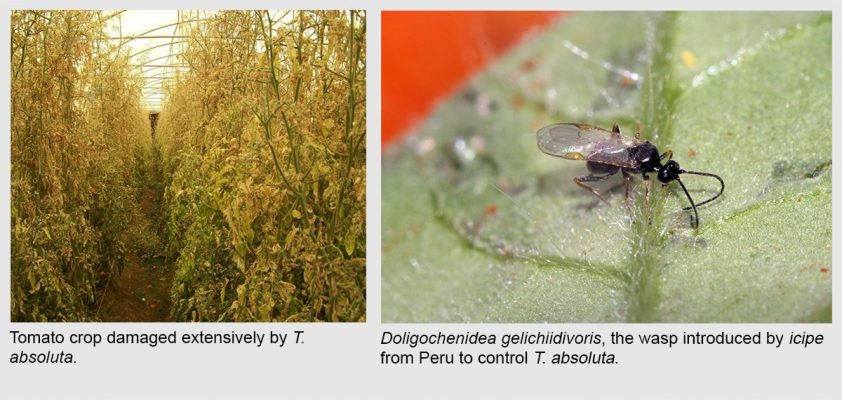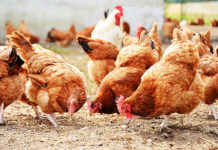icipe releases wasp to control devastating tomato leafminer
In a landmark move for tomato production in Africa, the International Centre of Insect Physiology and Ecology (icipe) has released a parasitic wasp that will naturally control the invasive and highly destructive Tuta absoluta, a tomato leafminer that was detected for first time in Africa in 2008 and has since spread rapidly across the continent. The wasp has been imported by the Centre from Peru, the native home of the pest, and this is the first time it is being introduced outside its origin.
Typical of invasive species, T. absoluta has had significant, adverse impact on tomato farming, a vital sector in Africa. Cultivation of this all-year round crop contributes to nutritional food requirements, while also generating income and employment opportunities for numerous people along the value chain in rural and urban areas.
While tomato farming is constrained by a plethora of pests and diseases, the arrival of T. absoluta has been particularly devastating. Indeed, in the absence of effective control measures, the leafminer can cause 100% tomato yield loss. In fact, in some countries, for example Nigeria, the moth is referred to as “tomato ebola” due to its severity and ability to completely ravage tomatoes. The tiny T. absoluta caterpillars damage tomatoes by tunnelling into leaves and eating the green parts, causing the leaves to dry out; and by burrowing into the fruits, resulting in deformities and rotting.
“One of the main challenges in the control of T. absoluta is its fast reproduction rate, with many generations emerging per year. As such, the pest quickly develops resistance to major pesticides,” explains Dr Samira Mohamed, Senior Scientist, icipe. “This scenario has forced farmers to apply broad-spectrum synthetic insecticides, often in extremely high doses, and far too frequently. This has led to increased production costs, and pesticide residues in yield with detrimental impact on the health of growers, consumers and the environment,”
Over the past five years, icipe has conducted extensive studies to develop basic knowledge on T. absoluta: its bioecology, host range and distribution, as a critical basis for developing an integrated pest management strategy for the pest.
The Centre’s research has established classical biological control to be one of the most promising ways to manage T. absoluta. This approach involves exploration in the native home of the invasive pest to identify another beneficial insect, known as a natural enemy, that can significantly reduce populations of the former. The natural enemy is then introduced and re-united with the pest in the invaded region.
The wasp released by icipe, known scientifically as Doligochenidea gelichiidivoris, controls the leafminer by laying its eggs inside the pest’s caterpillars. The eggs eventually emerge as adult wasps thereby killing the larvae of the pest.
“KEPHIS has provided regulatory support for the importation and release of these important natural enemies to manage T. absoluta, and we are also involved in post release monitoring programmes,” noted Dr Isaac Macharia, General Manager, Phytosanitary Services, Kenya Plant Health Inspectorate Service (KEPHIS).
“The introduction of a natural enemy for T. absoluta is especially significant in view of the Centre’s wider goal of enabling Africa tackle the rising threat of invasive species, and their dramatic effect on agriculture and livelihoods across the continent,” states Dr Sunday Ekesi, Director of Research and Partnerships, icipe.
The initial field releases of the natural enemy were undertaken in Kirinyaga County, central Kenya, which is the largest producer of tomatoes in the country. The wasp is expected to spread rapidly, in search of infested plant material. icipe and collaborators will continuously monitor its progress, in terms of establishment and suppression of T.absoluta, as well as overall improvement of tomato yield. Subsequent releases are planned in other major tomato growing regions in Kenya, as well as in Ethiopia and Uganda.








